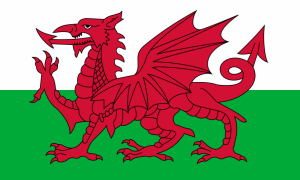By Sarah-Claire Jordan
 Welsh is a Brittonic language native to Wales, though it is spoken in England and other areas as well. As with many minority languages, the number of Welsh speakers has decreased over time, making it a language vulnerable to extinction but not yet endangered. It is an official language in Wales, along with English, but not in any other country.
Welsh is a Brittonic language native to Wales, though it is spoken in England and other areas as well. As with many minority languages, the number of Welsh speakers has decreased over time, making it a language vulnerable to extinction but not yet endangered. It is an official language in Wales, along with English, but not in any other country.
Its status in Wales is taken seriously, with most signs being in both Welsh and English. There are primary schools all over Wales that teach only in Welsh, and many jobs require that applicants know Welsh, like in customer service and teaching. Here are four pieces of information about Welsh that should give you a better understanding of the language:
- There are two main registers
Welsh is interesting in that it has two different registers, or you could say styles, of speaking and writing. They are Literary Welsh and Colloquial Welsh. Colloquial Welsh is what you are most likely to find if you are reading something in a newspaper, magazine, or listening to a group of people talk in an informal setting. Literary Welsh is used in the Welsh Bible, other literature, and official documents. Literary Welsh also has fewer loanwords from English incorporated into the vocabulary, and tends to use their Welsh equivalent. If you learn Welsh, you will most likely learn Colloquial Welsh.
- Pronouns are often doubled
Something that happens in Colloquial Welsh is a phenomenon known as “pronoun doubling”. This is when the personal pronoun that corresponds to the possessive pronoun is added to a statement, reinforcing who possesses what. This only happens in Colloquial Welsh, and is not meant to add any sort of extra emphasis, just to reinforce possession. Possessive pronouns can be used on their own, but to use a personal pronoun without adding a possessive pronoun is not considered correct.
- Welsh has four main dialects
Interestingly enough, there is no variety or dialect of Welsh that is considered to be the standard form. There are, however, four traditional main dialects: Y Wyndodeg of Gwynedd, Y Ddyfedeg of Dyfed, Y Wenhwyseg of Gwent and Morgannwg, and Y Bowyseg of Powys. Besides those four, there are others that fall into the grey areas. Dialects mostly differ in terms of vocabulary and pronunciation, but sometimes there are small grammar differences as well.
- There is a Welsh colony in Argentina
One of the other dialects of Welsh is Patagonian Welsh, which is spoken mostly in the Welsh settlement of Y Wladfa in the Argentine province of Chubut. The settlement was established in 1865 thanks to the Argentine government encouraging European immigrants to settle in the area. Teachers are sent from Wales periodically to train tutors, possibly because speaking Welsh is not as common as it once was. It has become a mark of prestige almost, with between 5,000 and 12,000 native speakers and around 25,000 who have it as their second language.
Alpha Omega Translations is a translation, interpretation, and desktop publishing company with years of experience with many languages, including the less common ones.
For an overview of our translation expertise, visit our website translation and localization page.



